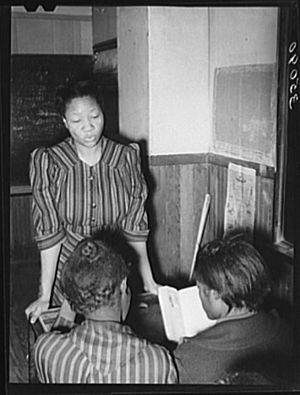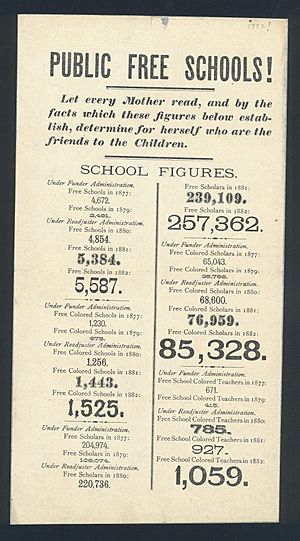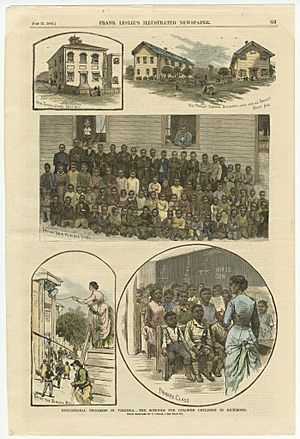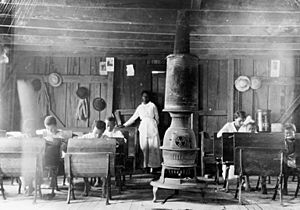African-American teachers facts for kids
African-American teachers played a huge role in their communities. During the time of slavery in the South, they secretly taught other African Americans to read. This was very brave because teaching enslaved people was against the law.
In the North, African Americans worked alongside White people. Some African Americans wanted their children to go to school with White children. However, many in the Black middle class preferred separate schools. They believed they could create excellent schools for their own community. This led to teaching becoming a very important job for Black people. Many Black families had several members who became teachers. They felt they could help their communities grow stronger through education.
Later, in the late 1800s and early 1900s, Southern states passed Jim Crow laws. These laws forced people of different races to be separate in all parts of life. They also tried to stop Black people from voting. Because of racism, it was hard for Black professionals to find jobs in other fields. By 1950, about half of all African-American professionals were teachers.
The Great Depression in the 1930s caused big money problems for Black Americans in the South. This made segregated Black schools much worse. As their money problems grew, African Americans asked for schools to be integrated. They hoped this would bring more resources to their schools.
Schools in the U.S. began to legally desegregate after the Supreme Court case Brown v. Board of Education in 1954. This meant Black and White students could go to school together. But desegregation also caused many Black schools to close. Most African-American teachers lost their jobs because White families often did not want Black teachers for their children. This meant Black communities lost important leaders and role models. It also made some Black communities lose trust in the school system.
Contents
Black Women as Educators in the 1800s
Why Education Was Important
In the 1800s, African-American leaders and teachers started working to spread education across the United States. After slavery ended in the mid-1800s, there was a big push for education in Black communities. Education was different in the North and the South. But important figures wrote speeches and fought for equal education everywhere.
African Americans used education as a tool to fight for equality, rights, and inclusion. Often, women led the way in these efforts. They worked to create more schools for Black students. They also pushed for higher education and fair chances for everyone to learn.
Education Before and After the Civil War
The history of education in the 1800s can be split into two main times. The first was during slavery, when people wondered if it was wise to educate enslaved people. The second was when people fighting to end slavery wanted to educate those who had been enslaved.
Early supporters of education for African Americans included slave owners who wanted more efficient workers. There were also kind people who wanted to help. And missionaries taught enslaved people English and Christian ideas. Freedmen's schools, missions, and churches were some of the first places enslaved people could start learning.
Education was a key topic before the American Civil War. It was discussed at the 1843 National Convention of Colored Citizens. Education was seen as a way to gain equality and improve one's social standing. Early efforts showed that education was a tool to fight inequality. The struggle for education was about achieving social and political equality. It was also about defeating unfair racial prejudice.
After the Civil War, local groups worked to build schools. Former enslaved people helped create the first effective system of free public schools in the Southern states. As industries grew, more Black-owned schools opened permanently.
Later, women who supported education fought for different goals. They wanted to end prejudice and promote kindness. They also trained Black women and men to be teacher-activists who would fight for civil rights. Finally, they aimed to build good character and intelligence in children and young people. The focus shifted to helping the whole community.
Teachers faced challenges, like school districts blocking Black educators. Sometimes, required teacher training was only available to White educators. Leaders often stressed the importance of getting a higher education. Many Black educators also fought for gender equality. The fight for education in the 1800s went beyond the classroom. It connected to many other big social issues.
Important Women Educators
These important women were activists in the 1800s. They also understood how important teaching was. While teaching, they sometimes had to leave their jobs. This allowed them to speak freely about unfairness based on race, class, and gender. These women showed how different issues are connected when fighting for change.
| Notable Figures | Background (As Educators) |
|---|---|
| Mary Ann Shadd | After the Fugitive Slave Act of 1850, Mary Ann Shadd Cary moved to Canada. There, she taught at a school for all races. She later returned to the U.S. and worked as a journalist. |
| Anna J. Cooper | Anna Julia Cooper was a student and teacher. She worked to take classes only for men at her university. She also earned her PhD from the University of Paris-Subbron. In her writings, she often wrote about education's impact. Her book A Voice from the South discusses the links between Christian beliefs, womanhood, and higher education. |
| Ann Plato | Ann Plato was a teacher who published essays and prose. In her work, she urged teachers and the nation to make sure children get an education. She also encouraged those who could, to get higher education to teach future generations. Not much is known about Plato, but her ideas on education are often used. |
| Ida B. Wells | Ida B. Wells Barnett started as an elementary school teacher in Memphis, Tennessee, at age fourteen. While teaching, she started her own newspaper called Free Speech. This cost her teaching job. Barnett then focused on journalism. She wrote about issues affecting Black communities, like lynching. |
| Lucy Craft Laney | Lucy Craft Laney was a teacher from Georgia. She worked at many schools before founding the Haines Institute in Augusta. She was the principal there. She also wrote about the role of women and the power of education. She encouraged women to work and go to school to gain status. Her work also mentioned high rates of imprisonment and racial differences. |
Writings by Black Women Educators
We can learn about the important Black women educators through their own writings. Below is a list of essays, speeches, and other works. These writings share the experiences of Black women, especially about education.
- 1841 - Ann Plato, "Education"
- 1886 - Virginia W. Broughton, "Womanhood a Vital Element in the Regeneration and Progress of Race"
- 1887 - Mary V. Cool, "Women's Place in the World of the Denomination"
- 1887 - Ida B. Wells Barnett, "Our Women"
- 1889 - Julia Caldwell-Frazier, "The Decisions of Time"
- 1891 - Fanny M. Jackson Coopin, "A Plea for the Mission School"
- 1892 - Anne J. Cooper, A Voice from the South
- 1893 - Anne J. Cooper & Fannie Barrier Williams, The Intellectual Progress of the Colored Women of the United States Since the Emancipation Proclamation
- 1893 - Sarah J. Early, "The Organized Efforts of the Colored Women of The South to Improve Their Condition"
- 1894 - Virginia W. Broughton, "Woman's Work"
- 1895 - Victoria Earle Matthews. "The Value of Race Literature"
- 1898 - Mary Church Terrell, "The Progress of Colored Women"
- 1899 - Lucy Craft Laney, "The Burden of the Educated Woman"
Inspiring Quotes
- "A good education is another name for happiness." - Ann Plato (1841)
- "No one suffers under the weight of this burden as the educated Negro woman does; and she must help to lift it." - Lucy Craft Laney (1899)
- "Whatever excuse may be offered in the states for exclusive institutions, I am convinced that … none could be offered with a shadow of reason, and with this conviction, I opened school here with the condition of admission to children of all complexions." - Mary Ann Shadd Cary (1853)
- "Black Women saw education as a vehicle to ready both personal and larger community goals." - Daina Ramey Berry & Jermaine Thibodeaux
 | James Van Der Zee |
 | Alma Thomas |
 | Ellis Wilson |
 | Margaret Taylor-Burroughs |





